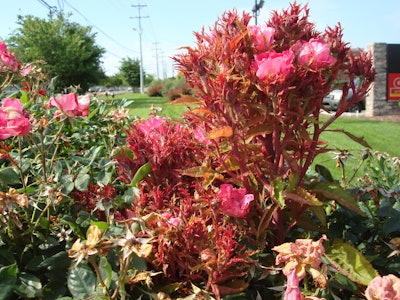 A common symptom of rose rosette disease is a witches’ broom of red stunted leaves.
A common symptom of rose rosette disease is a witches’ broom of red stunted leaves.Photo: Alan W./Extension.org
The state of Florida has so far been spared from the worst of a virus known as rose rosette disease, but its good fortune isn’t due to sheer luck.
The University of Florida Institute of Food and Agricultural Sciences (UF/IFAS) has been working to find a way to either prevent or treat the plant disease, which currently has no cure.
One of the greatest challenges in combatting rose rosette is detecting infected plants before the symptoms appear.
“A nursery might not know it has the disease and sell rose plants to unsuspecting customers,” Gary Knox, professor of environmental horticulture and extension specialist in nursery crops, told Greenhouse Grower. “Months later, the disease shows up. The major issue is being able to detect the virus before it shows up.”
In an effort to curb the disease, the U.S. Department of Agriculture has awarded a $3.3 million research grant to a group headed by David Byrne from Texas A&M University. Byrne and his team are trying to come up with an effective treatment for rose rosette as part of the National Institute of Food and Agriculture’s Specialty Crop Research Initiative.
As for UF/IFAS, it is trying to find a way to detect low levels of the virus, enabling nurseries and other growers to detect diseased plants before they are shipped.
Rose rosette can be found from the Rocky Mountains to the East Coast and preys on any plant in the genus Rosa.
“The goal is to detect the virus in non-symptomatic plants utilizing a rapid field-based assay,” said Mathews Paret, assistant professor of plant pathology and leader of the UF/IFAS research effort. “We need a technique where we can go to the field and test leaves in the field.”
Many nursery growers have donated plants and labor to the effort, as they are eager to find a way to control this widespread disease. According to Knox, rose production is a $400 million annual business in the United States, and Florida is the nation’s fourth largest producer.
Paret and his team have had some success in identifying rose rosette disease early in a plant’s life. As those efforts continue, the infected plants are exterminated by the state’s Division of Plant Industry.
Along with trying to find detection methods, the UF/IFAS research group is investigating compounds that could help the plants defend against the virus.
“We are trying to reduce the severity of the symptoms,” Paret said. “Continued monitoring of Florida roses at wholesale production, retail sales and landscape is extremely critical for preventing establishment of rose rosette virus, a highly destructive virus in Florida.”










